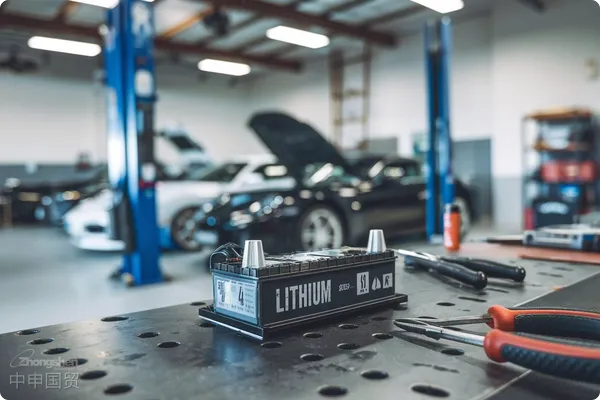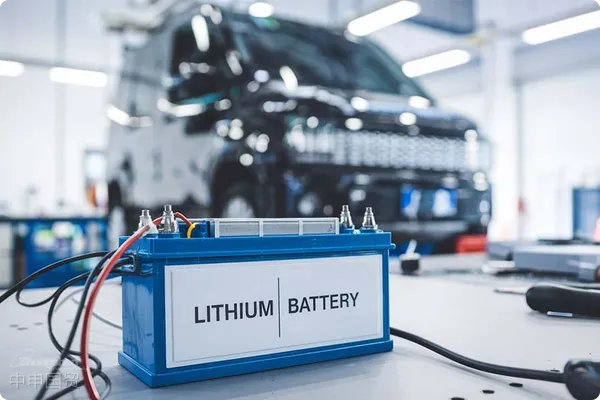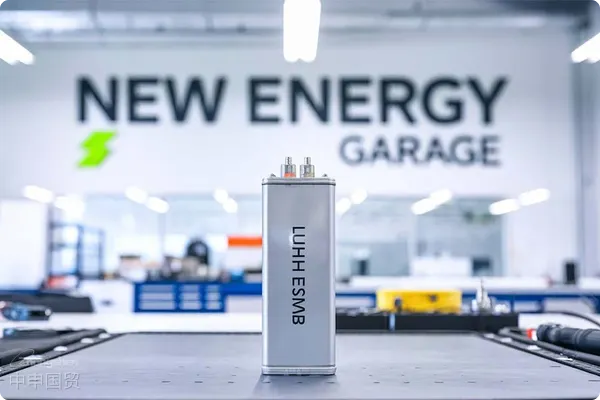- Shanghai Zhongshen International Trade Co., Ltd. - Two decades of trade agency expertise.
- Service Hotline: 139 1787 2118

Specializing in power lithium batteriesforeign tradeindustry, one-stopimport and exportsolution provider! With extensive experience, efficiently explore internationalNew energyvehicle and energy storage system markets! Mitigate various trade risks for your peace of mind!
With the growing global demand for clean energy, power batteries, as core components in fields such as new energy vehicles and energy storage systems, are experiencing rapidly expanding market demand. According to data from market research institutions, the global power battery market is expected to reach hundreds of billions of dollars by 2025. In this context, power batteryExport Representationenterprises serve as a crucial bridge connecting domestic manufacturers with international markets.
I. The Importance of Power Battery Export Agency Enterprises
Power battery export agency enterprises can provide professional foreign trade services to manufacturers, helping them explore international markets, reduce trade risks, and improve export efficiency. Specifically, the roles of agency enterprises mainly include the following aspects:
1. Market Development: Agency enterprises possess extensive international market resources and experience, enabling them to help manufacturers understand target market demands and trends, formulate appropriate market strategies, identify potential clients, and establish sales channels.
2. Trade services: Agency enterprises can provide one-stop trade services to manufacturers, including customs declaration, inspection, logistics, insurance, etc., ensuring smooth export of goods while reducing trade costs and risks.
3. Business Negotiation: Agency enterprises are familiar with international trade rules and practices, and can represent manufacturers in business negotiations with foreign clients to secure favorable trade terms and protect the manufacturers interests.
4. Risk Management: Agency enterprises can help manufacturers identify and mitigate risks in international trade, such as exchange rate risks, credit risks, and legal risks, safeguarding the manufacturers financial security and normal operations.
II. The Industry Landscape of Power Battery Export Agency Enterprises
Currently, there are numerous power battery export agency enterprises in China, resulting in intense market competition. Among them, some large agency enterprises have secured significant market shares due to their strong financial capabilities, extensive industry experience, and professional service teams. Meanwhile, with the rapid development of the new energy vehicle industry, some emerging agency enterprises have gradually risen to prominence, becoming rising stars in the industry.
When selecting a power battery export agency, manufacturers need to comprehensively consider factors such as the agencys qualifications, reputation, service level, and pricing to choose a suitable partner. Additionally, manufacturers can gain insights into an agencys market reputation and service quality by participating in industry exhibitions and communicating with peers, providing references for their selection.
III. Operational Process of Power Battery Export Agencies
The operational process of power battery export agencies generally includes the following steps:
1. Sign an Agency Contract: The manufacturer and the agency sign an agency contract, clearly defining the rights and obligations of both parties, including the scope of agency, service content, fee structure, and settlement methods.
2. Market Research: The agency conducts market research based on the manufacturers needs, understanding market demand, competition, and trade policies to provide references for the manufacturers market strategy.
3. Finding Customers: The agency identifies potential clients through various channels such as exhibitions, online platforms, and business visits, and communicates with them to understand their needs and intentions.
4. Business Negotiation: The agency represents the manufacturer in business negotiations with clients, covering aspects like product pricing, delivery schedules, payment terms, and quality standards, aiming to secure favorable trade conditions.
5. Sign the Contract: The agency assists the manufacturer in signing contracts with clients, clarifying the rights and obligations of both parties to ensure smooth contract execution.
6. Goods export: The agency handles customs declaration, inspection, and logistics to ensure the smooth export of goods.
7. Payment Settlement: The agency assists the manufacturer in settling payments with clients according to the contract terms, ensuring timely receipt of payments.
8. After - sales Service: The agency helps the manufacturer address client complaints and feedback, providing after-sales services and maintaining client relationships.
Below are detailed explanations and examples for each step:
1. Sign an Agency Contract:
2. Market Research:
3. Finding Customers:
4. Business Negotiation:
5. Sign the Contract:
6. Goods export:
7. Payment Settlement:
8. After - sales Service:
Key Contract Points for Power Battery Export Agency Companies
The contract of a power battery export agency company serves as the foundation for bilateral cooperation, with its content and clauses directly impacting the interests and responsibilities of both parties. Therefore, prior to signing the contract, both parties must carefully negotiate and review its content and terms to ensure legality, reasonableness, and validity. Below are some key points of the contract for power battery export agency companies:
1. Contract Parties: The contract parties include the agency company and the manufacturing company, both of which need to specify basic information such as their respective names, addresses, and contact details.
2. Scope of Agency: The contract must clearly define the agency scope, including product types, quantities, prices, and delivery schedules.
3. Service Content: The contract must specify the agency services, including market research, client development, business negotiations, contract signing, goods export, payment settlement, and after-sales services.
4. Fee Standards: The contract must outline the fee structure, including agency fees, customs clearance fees, inspection fees, and logistics costs.
5. Settlement Methods: The contract must clarify the settlement methods, including payment settlement for goods and agency fees.
6. Liability for Breach of Contract: The contract must define the liabilities for breach of contract, including breach scenarios, responsibilities, and compensations.
7. Dispute ResolutionFees: The contract needs to clarify the charging standards and payment methods of the agency company.
8. Contract Term: The contract must specify the contract duration, including the effective date and termination date.
9. Other Terms: The contract may also include other clauses, such as confidentiality agreements, intellectual property clauses, and force majeure clauses.
Below is a detailed framework example of a contract for a power battery export agency company:
Contract No.:[Contract No.]
Signing Date:[Signing Date]
Party A:[Manufacturer Name]
Address:[Manufacturer Address]
Contact Information:[Manufacturer Contact Details]
Legal Representative:[Manufacturer Legal Representative]
Party B:[Export Agency Company Name]
Address:[Export Agency Company Address]
Contact Information:[Export Agency Company Contact Details]
Legal Representative:[Export Agency Company Legal Representative]
Whereas Party A is a professional power battery manufacturer and Party B is a professional export agency company, both parties, through friendly negotiations, have reached the following agreement regarding Party As entrustment of Party B to handle power battery exports::
I. Agency Scope
The power battery products entrusted by Party A to Party B for export include [Product Name], [Product Model], and [Product Specifications].
The quantity of power battery products to be exported by Party B on behalf of Party A is [Quantity], priced at [Price], with a delivery period of [Delivery Period].
II. Service Content
Party B shall provide Party A with one-stop foreign trade services including market research, customer development, business negotiation, contract signing, goods export, payment settlement, and after-sales service.
Party B shall handle customs declaration, inspection, and logistics procedures for Party A to ensure smooth export of goods.
Party B shall conduct business negotiations with foreign clients on behalf of Party A to secure favorable trade terms and protect Party As interests.
Party B shall handle customer complaints and feedback, provide after-sales service, and maintain Party As customer relationships.
III. Fee Structure
The agency fee charged by Party B shall be [percentage] of Party As export sales, and the settlement method for the agency fee shall be [settlement method].
The customs declaration fee, inspection fee, logistics fee, and other charges shall be based on actual costs incurred, and the settlement method for these fees shall be [settlement method].
IV. Settlement Method
The payment settlement method between Party A and Party B shall be [settlement method], with a settlement cycle of [settlement cycle].
The agency fee settlement method between Party B and Party A shall be [settlement method], with a settlement cycle of [settlement cycle].
V. Liability for Breach of Contract
If Party A fails to deliver goods according to the agreed time, quantity, or quality, or fails to make payments according to the agreed price or payment method, Party A shall be liable for breach of contract, pay a penalty of [penalty amount], and compensate Party B for any losses incurred.
If Party B fails to handle customs declaration, inspection, or logistics procedures according to the agreed time, quantity, or quality, or fails to conduct business negotiations with foreign clients according to the agreed price or payment method, Party B shall be liable for breach of contract, pay a penalty of [penalty amount], and compensate Party A for any losses incurred.
If either Party A or Party B violates any other terms of the contract, the violating party shall be liable for breach of contract, pay a penalty of [penalty amount], and compensate the other party for any losses incurred.
VI. Dispute Resolution
The dispute resolution method for this contract shall be [dispute resolution method].
If any dispute arises during the performance of this contract, both parties shall first attempt to resolve it through friendly negotiation. If negotiation fails, either party may file a lawsuit with the competent peoples court.
VII. Contract Term
This contract shall be valid for [contract term] and shall take effect from the date of signing.
If no breach occurs during the contract term and both parties agree to continue cooperation, this contract may be automatically renewed for a term of [renewal term].
VIII. Other Terms
Matters not covered in this contract may be supplemented through mutual negotiation, and such supplements shall be made in writing as annexes to this contract, with the same legal effect as this contract.
This contract is executed in duplicate, with each party holding one copy, both having the same legal effect.
Party A:[Manufacturer Name] (Seal)
Legal Representative:[Manufacturer Legal Representative] (Signature)
Party B:[Export Agency Company Name] (Seal)
Legal Representative:[Export Agency Company Legal Representative] (Signature)
V. Considerations for Power Battery Export Agency Companies
When selecting and cooperating with a power battery export agency company, manufacturers should pay attention to the following points:
1. Qualification and Reputation:Choose an agency company with good qualifications and reputation to ensure it has the capability and experience in foreign trade agency business. Verify the agency companys basic information by checking its business license, tax registration certificate, organization code certificate, and other documents. Additionally, assess the agency companys market reputation and credibility through online channels, industry associations, etc.
2. Service LevelSelect an agency with high service standards to ensure it can provide professional, efficient, and high-quality foreign trade services for manufacturers. Evaluate the agencys service team, processes, and quality to assess its service level.
3. Reasonable pricingChoose an agency with reasonable pricing to ensure its fees align with market rates and your actual needs. Compare fee structures among different agencies to select one with the best cost-performance ratio.
4. Contract termsBefore signing a contract, carefully review the terms to ensure they align with both parties interests and legal requirements. Pay attention to clauses such as scope of agency, service content, fee structure, payment methods, liability for breach, and dispute resolution to avoid loopholes and conflicts.
5. Risk preventionDuring cooperation, focus on risk prevention to avoid trade and legal risks. Strengthen supervision and management of the agency, stay updated on its operations and business progress, and establish a risk early-warning mechanism to promptly identify and address risk events.
6. Communication and CoordinationEnhance communication and coordination with the agency to build a strong partnership. Provide timely product information and market demand, assist the agency in market research and client development, and offer feedback on its services and suggestions to help it continuously improve.
In summary, selecting the right power battery export agency is crucial for manufacturers to expand into international markets and improve export efficiency. Manufacturers should consider the agencys qualifications, reputation, service level, and pricing to choose the right partner. Additionally, strengthen communication and coordination to foster a productive relationship and jointly advance power battery export operations.
Related Recommendations
Category case
Contact Us
Email: service@sh-zhongshen.com
Related Recommendations
Contact via WeChat

? 2025. All Rights Reserved. Shanghai ICP No. 2023007705-2  PSB Record: Shanghai No.31011502009912
PSB Record: Shanghai No.31011502009912







